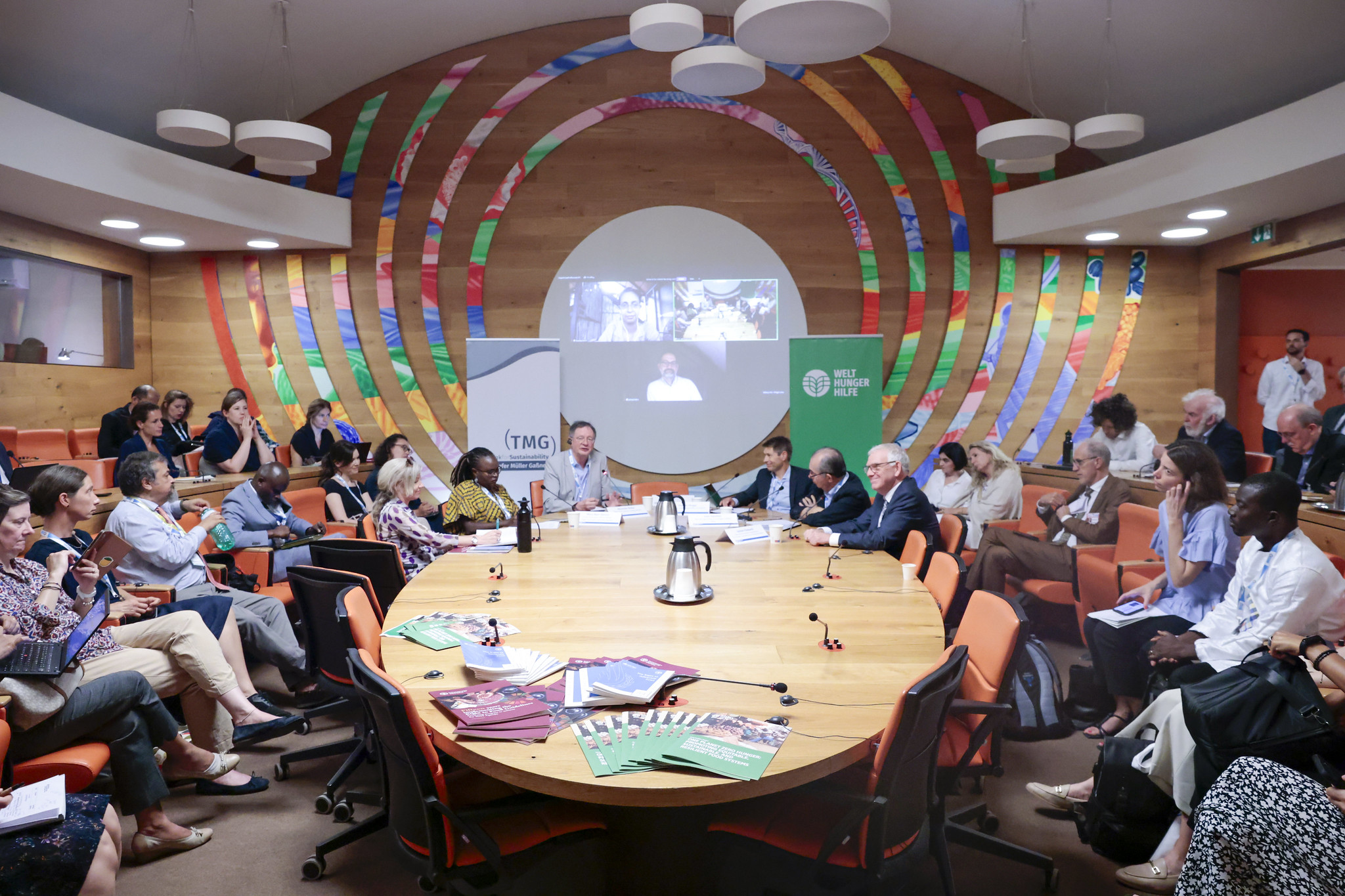UNFSS Stocktaking Moment: Empowering Civil Society for Inclusive Food Systems Transformation
Highlights of UNFSS Stocktaking Moment - side event on civili society actors and marginalized groups in governance of food systems transformation.
by Harry Hoffmann | 2023-07-27

TMG Research gGmbH, together with Welthungerhilfe, BMEL, and BMZ, hosted a high-level side event on July 25th in Rome as part of the UNFSS stocktaking moment entitled "How to re-set the table? Challenges and opportunities for civil society actors and marginalized groups in shaping the governance of Food Systems transformation." The event was moderated by Alexander Müller, managing director of TMG Thinktank. The aim of the event was to emphasize the importance of placing the governance of the corresponding transformation processes on a broad societal basis so that they can also be successful in the long term.
After a short introduction by Mathias Mogge, CEO of Welthungerhilfe, Michael Fakhri, the UN Special Rapporteur on the Right to Food (RtF), criticized in his keynote that the RtF was only represented in the conference program by way of this side event. In addition, he emphasized that the RtF was named as one of many policy instruments at the Summit and not as what it actually represents: an essential human right. Against this background, the subsequent panel discussion focused on what has already been achieved at the local level and can thus serve as a role model.
Mary Njeri Karanu from Rural Outreach Africa (ROA) spoke about the Lake Region Food Systems Network, an association of 20 NGOs in 5 counties at Lake Victoria, which has managed to have its concerns included in the budgetary 5-year planning in the regions.
Juan Sanchez of Red de Agricultura Ecológica Peru followed with an example of how a civil society coalition has been actively involved in food security in the greater Lima region.
In turn, Shamika Mone, President of the Inter-continental Network of Organic Farmers Organizations (INOFO), showed how the targeted involvement of producer organizations in the Indian state of Kerala has led to the establishment and maintenance of practices of traditional rice cultivation, which in turn brings great benefits to the ecosystem. Shamika also had the opportunity to bring in aspects from a TMG-led discussion series from January 2023 as well as wider discussions at the Partners for Change conference from June 23.
After an intensive discussion with the audience (including comments by Prof. Joachim von Braun), State Secretary Jochen Flasbarth brought the strands together and underlined the importance of the implementation of the RtF for the German government and the essential role of the equal involvement of civil society groups. As an essential aspect, he emphasized that inclusive and diverse societies are simply more resilient to crises. His concise conclusion then broke the discussion down to a simple and coherent fact: "The more involvement of local communities, the better the solutions."
 Urban Food FuturesFeb 09, 2026
Urban Food FuturesFeb 09, 2026Pushing the horizon: Urban farming and community-led innovation in Mukuru informal settlement
A small community-run greenhouse in Mukuru is offering insights into how controlled-environment agriculture can strengthen food security in urban environments under increasing pressure—and a look into the future of food systems in informal settlements.
Christian Sonntag, Emmanuel Atamba, Lumi Youm
 Land GovernanceDec 18, 2025
Land GovernanceDec 18, 2025Land tenure, women’s land rights, and resilience: Reflections from CRIC23 toward UNCCD COP17
Our experts discuss what the exchanges at CRIC23 highlighted and revealed about the role of secure and gender-equitable land tenure in the UNCCD's work ahead of the 2026 triple COP year.
Frederike Klümper, Washe Kazungu
 Urban Food FuturesDec 09, 2025
Urban Food FuturesDec 09, 2025The story of Mukuru's Urban Nutrition Hub
In Mukuru informal settlement, a safe haven for women has grown into the Urban Nutrition Hub, a multi-purpose space for nutrition education, training, and community development, demonstrating the potential of grassroots community-owned innovation..
Serah Kiragu-Wissler


